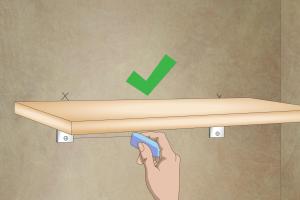Ultimate Guide to Installing Shelves: Step-by-Step Techniques for a Polished Look

-
Quick Links:
- Introduction
- Tools Required
- Types of Shelves
- Choosing the Right Location
- Measuring and Marking
- Installation Process
- Decorating Your Shelves
- Maintenance Tips
- Case Studies
- Expert Insights
- FAQs
Introduction
Installing shelves can transform a room, adding both functionality and aesthetic appeal. Whether you're looking to display your favorite books, showcase decorative items, or maximize storage in a small space, knowing how to properly put up shelves is essential. This comprehensive guide will take you through the entire process, from planning to installation, ensuring a polished and professional look.
Tools Required
Before diving into the installation process, it's crucial to gather the necessary tools. Here’s a list of tools you’ll need:
- Drill and drill bits
- Screwdriver
- Level
- Tape measure
- Pencil
- Stud finder
- Brackets (if required)
- Wall anchors (if required)
- Safety goggles
- Work gloves
Types of Shelves
Understanding the different types of shelves available can help you make the right choice for your space. Here are some popular options:
- Floating Shelves: These shelves appear to "float" on the wall without visible brackets, giving a sleek, modern look.
- Bracketed Shelves: These shelves are supported by brackets, offering a classic design that can handle heavier items.
- Corner Shelves: Ideal for utilizing unused corner space, these shelves can be both functional and decorative.
- Adjustable Shelves: Perfect for versatility, these shelves can be repositioned based on your storage needs.
- Built-in Shelves: Custom-built to fit a specific space, these shelves can enhance your home’s architectural features.
Choosing the Right Location
Carefully selecting where to place your shelves is vital for both aesthetics and functionality. Consider the following:
- Room purpose: Shelves in a living room may differ from those in a kitchen or office.
- Height: Ensure shelves are accessible without needing a step stool.
- Lighting: Avoid placing shelves in dark corners unless you plan to add lighting.
Measuring and Marking
Once you've chosen a location, it's time to measure and mark where the shelves will go. Here’s how:
- Use a tape measure to determine the desired height for your shelves.
- Mark the wall lightly with a pencil at the desired height.
- Use a level to ensure your marks are straight.
- For bracketed shelves, measure the distance between the brackets and mark accordingly.
Installation Process
The installation process can vary depending on the type of shelf. Here’s a step-by-step guide for installing bracketed shelves:
- Determine the location of the studs using a stud finder. Mark these locations.
- Align the brackets with the stud marks and mark the drill holes.
- Drill pilot holes into the wall at the marked locations.
- Attach the brackets to the wall using screws, ensuring they're level.
- Place the shelves on the brackets and secure with screws if necessary.
Decorating Your Shelves
Once your shelves are up, it's time to style them! Here are some tips:
- Group items in odd numbers for a more appealing look.
- Mix different textures and materials for visual interest.
- Incorporate greenery with small plants or flowers.
- Use books, photos, and decorative objects to create a personal touch.
Maintenance Tips
To keep your shelves looking great, consider the following maintenance tips:
- Dust regularly to keep items clean.
- Check for loose brackets or screws and tighten them as needed.
- Avoid overloading shelves to prevent sagging or damage.
Case Studies
Let’s look at a few case studies where homeowners successfully installed shelves:
Case Study 1: Floating Shelves in a Small Apartment
In a 500 sq. ft. apartment, floating shelves added an element of style while maximizing storage. The homeowner strategically placed them above the desk and in the living area to display decor and books without sacrificing floor space.
Case Study 2: Kitchen Shelving Solutions
A family renovated their kitchen by adding open shelving. This design choice not only created a modern aesthetic but also made frequently used items more accessible, enhancing overall kitchen efficiency.
Expert Insights
We spoke with interior designer Jane Doe, who shared valuable insights on shelf installation:
"When installing shelves, consider the overall style of your space. Shelves should complement your decor rather than clash with it. Also, don't hesitate to get creative with how you use them!" - Jane Doe, Interior Designer.
FAQs
1. What type of shelves are best for heavy items?
Bracketed shelves are ideal for heavy items as they provide better support.
2. Can I install shelves without a stud finder?
While it's possible, using a stud finder ensures that your shelves are securely mounted.
3. How high should I install shelves?
Typically, shelves are installed about 12 to 18 inches above furniture, but this can vary based on personal preference.
4. What materials are best for DIY shelves?
Wood and metal are popular choices for DIY shelves due to their durability and aesthetic appeal.
5. Do I need wall anchors for every shelf?
Wall anchors are recommended for shelves that won’t be mounted directly into studs.
6. How can I ensure my shelves are level?
Use a level tool while marking and installing to ensure your shelves are straight.
7. What’s the best way to decorate shelves?
Mix books, decor items, and plants in odd numbers for a balanced look.
8. Can I install shelves on drywall?
Yes, but ensure you use appropriate anchors for support.
9. How much weight can floating shelves hold?
This varies by design and wall material, but typically 15-20 lbs per shelf is common.
10. What’s the most important tip for installing shelves?
Planning and measuring accurately is key to a successful shelf installation.
Random Reads